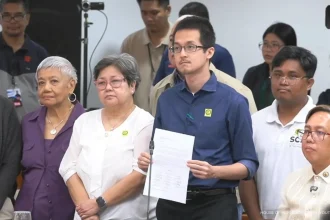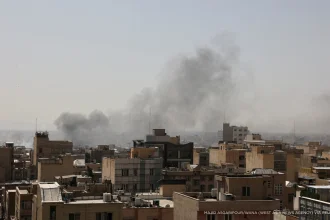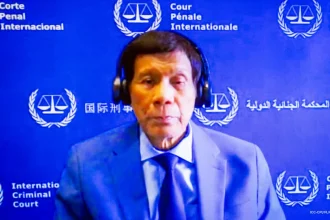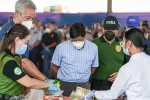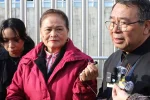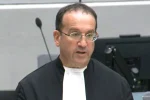
+ Emerging variants: The “FLiRT” variant is driving new COVID-19 cases globally, but an expert says it only poses “low public health risk.”
+ Need for updated vaccines: Experts warn about the waning effectiveness of existing COVID-19 vaccines against new variants like “FLiRT,” prompting discussions about the need for updated booster shots.
+ Government’s post-pandemic action: The Philippines did not budget for COVID-19 vaccines in 2024 following the lifting of the state of public health emergency for the coronavirus. Health officials say they are processing to get updated doses, but also advise the public on individual-based risk management.
Metro Manila, Philippines — In the post-COVID-19 era, Filipinos have returned to a state of normalcy generally marked by non-observance of physical distancing and optional mask wearing.
Early on in the pandemic, the Philippines was among a number of countries that haggled for access to COVID-19 vaccines. But with the public health emergency lifted, is there still a need to get inoculated?
Waning effect
In a televised public briefing in May, Rontgene Solante, an infectious diseases expert, said updated COVID-19 vaccines are unavailable in the country, making Filipinos vulnerable to new variants.
“Nakakalungkot lang because of the mutations, itong mga bagong variant hindi na tayo protektado doon sa unang mga bakuna natin na nakukuha natin,” said Solante, president of the Philippine College of Physicians.
[Translation: It is sad because of the mutations of these variants, we are not protected from the first vaccines that we got.]
“Kung pag-usapan ang bakunado ngayon, talagang tayo lahat ay vulnerable na,” he added, warning that elderly vaccinated against the coronavirus might have severe illnesses.
[Translation: If we talk about the vaccinated, all of us are really vulnerable.]
Should the country then obtain new COVID-19 shots? Tony Leachon, a health reform advocate, said, “Ideally, with the new FLiRT variant we should get a booster but we have not budgeted for this unexpected event.”
Health Department spokesperson Albert Domingo said “immunity from the original primary series and boosters wanes over time, but is not totally lost.”
“There may be some degree of residual immunity left which is still better than having not been vaccinated at all,” he told reporters.
The Philippine government exerted efforts to achieve herd immunity against the coronavirus disease that caused a global emergency in 2020. According to the World Health Organization (WHO), herd immunity means “ the indirect protection from an infectious disease that happens when a population is immune either through vaccination or immunity developed through previous infection.”
In the country, around 78.4 million individuals were fully vaccinated against the virus as of March 2023, higher than the 78.1 million target, the Department of Health (DOH) said in a Viber message.
Department of Health (DOH) data show nearly 24 million people received their first booster shot, including four million with a second booster. Official figures further showed around 82.6 million Filipinos were inoculated with at least one dose.
Health Secretary Ted Herbosa previously said around five million Filipinos were infected through natural immunity.
‘Low-risk’
President Ferdinand Marcos Jr. lifted the state of public health emergency due to COVID-19 in the Philippines in July 2023. This was after three years since his predecessor, Rodrigo Duterte, issued the declaration in March 2020.
The last DOH report showed that as of Jan. 8 this year, there were 4,140,383 COVID-19 cases in the country, with 66,864 deaths. At that time, there were 6,138 active infections recorded nationwide.
But since May, the agency has been reporting new numbers of COVID-19 cases. It said the uptick is “slow, still mild and manageable,” and far from the daily case average in January and May 2023.
The Health Department also confirmed the detection of two cases of the KP.2 strain, part of what scientists called the “FLiRT” variant due to their mutations. Recent sequencing data, however, does not affect ongoing protocols and clinical management, it also said.
“There is still no evidence now that the KP.2 and KP.3 variants are causing severe to critical COVID-19, both locally and internationally,” the DOH said. “Further assessment continues to determine transmissibility and capacity to evade immune response.”
In a televised public briefing in May, Solante said the two variants have a “low public health risk” unlike the Delta and Alpha variants which caused severe cases and deaths.
He also cautioned the vulnerable sector, including the elderly and those with underlying illness, to wear face masks in crowded places or gatherings especially if they have respiratory symptoms.
In an interview with NewsWatch Plus in May, Leachon said the antiviral drug molnupiravir, which can be given for five days, is “another weapon” to fight COVID-19.
Leachon said there are still isolated and few cases of COVID-19 but “these can be managed as an ordinary flu infection.”
“Just in case you will have COVID-19, meron tayong [we have an] antiviral drug, the name is molnupiravir…which can be given for five days. That’s another weapon for us,” said Leachon, an internist and cardiologist at the Manila Doctors Hospital.
The Food and Drug Administration (FDA) issued an authorization granting the emergency use approval of molnupiravir with conditional marketing authorization.
Last December 2023, Herbosa said hospitals had also trimmed their allocation for COVID-19 beds.
“We are educated, engaged, and empowered already on how to diagnose COVID-19 because nagmura na ‘yong mga testing [testing became cheaper],” Leachon said. “Therefore, at the house, we can test ourselves kung positive tayo [if we are positive], we can isolate and then kung [if] negative, then we can go back to our daily lives.”
“Kung may comorbid condition naman tayo at symptomatic [If we have comorbid condition and are symptomatic], then we can treat ourselves with the use of medication, plus the antiviral drug, and I think that’s the impetus for not ordering COVID-19 vaccines,” he added.
PH did not buy COVID-19 vaccines for 2024
In his proclamation in July 2023, Marcos said all emergency use authorization (EUA) issued by the FDA for COVID-19 vaccines “shall remain valid for a period of one year from the date of lifting of the State of Public of Public Health Emergency for the sole purposes of exhausting the remaining vaccines.”
After the expiration of the EUA, manufacturers of COVID-19 vaccines would need a certificate of product registration from the FDA to sell and distribute in local markets.
The United States Centers for Disease Control and Prevention is recommending the 2023-2024 updated vaccines of Pfizer-BioNTech, Moderna, or Novavax. The US CDC explained that the 2023-2024 formulation of the three vaccines “has been updated to a monovalent vaccine based on the Omicron XBB.1.5 sublineage of SARS-CoV-2.”
But in June, the US FDA advised vaccine makers that their 2024-2025 formula for COVID-19 shots should target the JN.1 lineage of the coronavirus. The four variants under monitoring are under this lineage.
In a press conference in December 2023, Herbosa said the DOH did not set aside funds for COVID-19 vaccine doses, including new vaccines as they were “still experimental.”
At that time, he said he accepted the COVAX Facility’s offer to donate one million doses of monovalent XBB vaccines. The doses were for the at-risk population, such as the elderly and those with underlying illness.
In one of its recent responses, the DOH said it is “processing this to obtain the best/most updated COVID-19 vaccines given the circumstances.”
The agency explained, however, that since it observed low or mild case severity with the KP.2 and KP.3 variants, “there may not be an urgent need to budget and procure as before.”
Now, it is the FDA’s duty to “encourage and accept applications for registration of the newer COVID-19 vaccines so that they may be made available in the local market,” the department said.
Lessons from COVID-19
For Herbosa, observing minimum public health standards is a way to fight against COVID-19.
“Managing your own personal risk, ito ‘yong na-change na narrative [this is the changed narrative],” he told reporters in December 2023. “ During the pandemic, the government tried to protect everyone — blanket. Now, it’s back to individual-based risk management.”
Leachon, who was an adviser in the COVID-19 task force, also said the country must be prepared especially for another public health emergency.
“We should learn from the lessons of the last pandemic that when we order vaccines, I think it should be with [a] sense of urgency and we have to have public-private partnership, particularly those merong [with] knowledge regarding vaccine deployment,” he told NewsWatch Plus.
He suggested mobilizing more medical professionals in vaccination sites, quicker deployment of vaccines, and administering the doses even in the tarmac area of airports or nearby places for other localities in the country.
In December 2022, the House of Representatives passed on third and final reading a Marcos administration’s priority bill establishing a Philippine Centers for Disease Prevention and Control. This would lead the country’ s response to public health emergencies.






